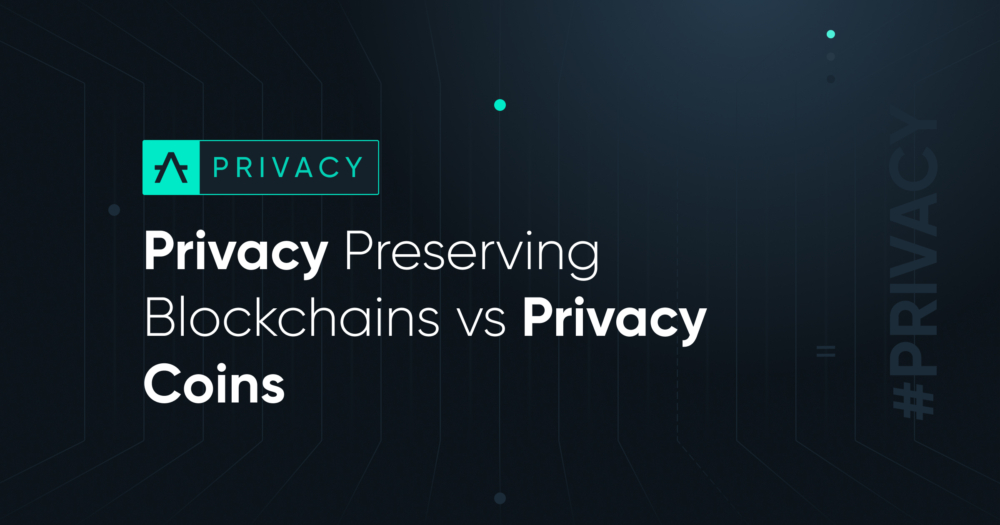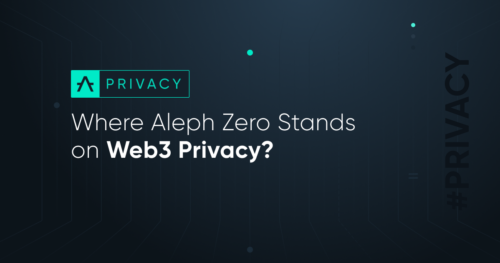Privacy Coins vs Privacy Preserving Blockchains
Sep 14, 2023

We’ve looked into privacy coins and their history since the early Bitcoin days. We’ve also looked at the emerging shift towards privacy-preserving blockchains and how they leverage different methods like zk proofs.
Now let’s look at the relationship between these two technologies and how one has led to the other.
The Difference Between the Two
To recap, privacy coins are a category of cryptocurrencies that prioritize enhanced privacy and anonymity features in their design and functionality. Meanwhile, privacy preserving blockchains are a subset of the underlying technology behind cryptocurrency that focuses on enhancing the confidentiality and anonymity of participants’ data and transactions.
The key difference to keep in mind when we’re talking about these two solutions is that privacy preserving blockchains extend the functionality of privacy coins. They introduce new privacy features that can apply for applications beyond sending transactions.
We can think of privacy preserving blockchains as being a more general purpose approach to privacy use cases. In fact, one could say that they’re the next step in the evolution of privacy coins we looked into in the previous post.
Comparison: Privacy Coins vs Privacy Preserving Blockchains
To better understand this evolution, let’s compare privacy coins with privacy preserving blockchains according to their different properties.
A quick side-by-side comparison would look like this:
| Privacy Coins | Privacy Preserving Blockchains | |
| Scope | Individual cryptocurrencies | Entire blockchain ecosystems |
| Use Cases | Primarily private financial transactions | Support various general purpose use cases beyond transactions |
| Default Behavior | Privacy features are usually enabled by default | Offer selective privacy options |
| Privacy Technologies | Specialized cryptographic techniques like ring signatures, stealth addresses, and zk proofs. | A diverse range of privacy technologies, including zk proofs, homomorphic encryption, confidential smart contracts, MPC, and state channels. |
However, let’s zoom into these properties to get a better idea of what they mean.
Privacy Coins
- Scope: Privacy coins refer to individual cryptocurrencies that are explicitly designed to provide enhanced privacy and anonymity features.
- Use Cases: Privacy coins are primarily designed to facilitate private transactions and financial interactions. They are often used when users want to keep their transaction details, including sender, receiver, and transaction amounts, confidential.
- Default Behavior: In privacy coins, privacy features are typically enabled by default, meaning that all transactions on the network are private unless users specifically opt for transparent transactions. Users can choose to expose certain transaction details, but the default behavior is to prioritize privacy.
- Privacy Technologies: Privacy coins employ specialized cryptographic techniques, such as ring signatures, stealth addresses, confidential transactions, and zk proofs, to achieve their privacy goals.
Privacy Preserving Blockchains
- Scope: Privacy preserving blockchains refer to entire blockchain ecosystems or platforms that incorporate privacy-enhancing features as part of their design. These features can extend beyond just financial transactions.
- Use Cases: Privacy preserving blockchains are designed to support various use cases beyond just private financial transactions. They can include private smart contracts, decentralized identity, secure data sharing, and more.
- Default Behavior: Privacy preserving blockchains often offer selective privacy. Users can choose whether to use the privacy features for specific transactions or interactions, depending on their requirements.
- Privacy Technologies: These blockchains may incorporate a wide range of privacy technologies, such as zk proofs, homomorphic encryption, confidential smart contracts, state channels, and other cryptographic methods, to enhance privacy across various use cases.
Who Will Define the Future of Web3 Privacy?
We should, however, note that the relationship between privacy coins and privacy preserving blockchains is not adversarial. It could be more about complementing certain functionalities with others in a modular, mix-and-match way for web3 users. However, one would have to note that while privacy-preserving blockchains have means to stay compliant with regulations, privacy coins are likely to be used within a limited group of users.
While the space has seen a lot of iteration over privacy coins like Monero, Zcash, and Dash, there’s a lot of excitement in the privacy-preserving blockchain side of the conversation. Projects like Aleph Zero are favoring the general purpose approach with private smart contracts and other features that will provide enterprise-grade solutions to privacy in the near future.
Tune in to the Aleph Zero podcast to go in-depth and learn more about privacy coins and privacy preserving blockchains. Join the Aleph Zero community for updates on the latest developments on web3 privacy.

